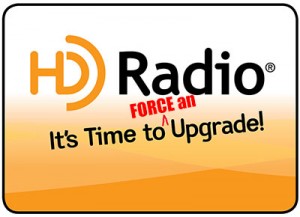
Will the industry try to force an HD radio upgrade on the AM band?
John Anderson says that “the stakes are much higher” than what I characterized in my post. “Getting AM to go all-digital is an audacious way to set precedent for an all-digital transition on both bands, especially since ‘marketplace forces’ aren’t cutting it.”
John expands on this point in a piece he published last week at DIYMedia.net, titled “Greasing the Skids for AM’s Digital Transition.” He argues that the pro-digital proposal offered by CBS Radio SVP Glynn Walden at NAB is a “test-balloon to see if the initial reaction is positive or negative,” which is the first step in crafting new policy and creating enough momentum in DC to make it appear like the change is “already well-established.”
Reader Matt reminds us that Paul Thurst wrote a four-part series on the revitalization of the AM band on his Engineering Radio blog. In this series he critically deconstructs WBCN-AM’s reportedly “nearly flawless” test of all-digital HD Radio broadcasts last December, noting that “From a technical standpoint this is about as favorable testing configuration as can be conceived for AM IBOC.” Yet, he notes that “the actual data from the tests has yet to see the light of day and may never be released.”
Thurst reviews the history of AM to give some needed perspective to demonstrate that the problems with the band result from “a death from a thousand cuts.” These lacerations include heavy debt loads taken on by broadcasters, as well as resources directed away from AM stations.
In part 3 he analyzes the causes of interference on the AM band and offers some potential technological solution.
Ultimately, Thurst’s arguments align with Anderson’s. Both are wary of an industry push to implement all-digital broadcasting using HD Radio technology on the AM band. It’s a technology Thurst calls “a yet unproven proprietary digital modulation scheme.”
Anderson concludes that such an initiative “reeks of hypocrisy,” since it seeks to use FCC power to effect a change that the marketplace clearly does not support, but under the auspices of “a U.S. policy environment steeped in the tenets of neoliberalism.”
The question is: will the FCC be moved to heed industry players with vested interests in HD Radio technology over the wishes of listeners, who have indicated their preferences by not adopting the technology in any meaningful numbers?


